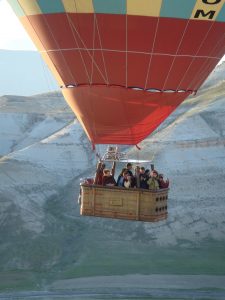Above the earth in a hot air balloon in Cappadocia. What could be more magical? No stress. No sense of routine. Heightened senses in an unfamiliar reality. It’s a perfect vacation activity, but not something you can do on a four day break from work.
Vacation travel raises suspicions. Once upon a time, the average American vacation was two weeks. Now, even if one has vacation time, the average vacation is four days. In 2014 only 25 percent of American workers took all the time they were allowed, and 15 percent of Americans didn’t take any time off. Sixty-one percent of people who did take vacation worked remotely.
We are a nation of workaholics. We don’t dare take time off, or our employers will think we’re not serious about our work. Yet our lack of leisure contributes to stress, anxiety, depression, and bad eating habits.
So let’s think about good reasons to take time for a true vacation, one where we leave our environment and unplug at least part of the time.
There are plenty of good reasons to take vacation time and travel somewhere different where we may not know the language or culture, where normal routine doesn’t exist, and where our minds are free to recharge. Actual scientific studies prove that travel is beneficial for our mental, physical, and emotional health — despite the hassle involved in reaching our destination. If it’s science rather than personal preference, perhaps vacation can be justified.
Here are the scientific benefits that caught my attention:
TRAVEL MAKES US HEALTHIER
Studies indicate that women who vacation at last twice a year have a lower risk of heart attack than those who travel only once every six years. Men who don’t take an annual vacation have a 30 percent higher risk of heart disease.
Responding to different bacteria, viruses and other foreign bodies strengthens our immune system.
Sightseeing gets us outside walking, enjoying sunshine,
TRAVEL RELIEVES STRESS
Three days after taking a vacation, people reported feeling less anxious, more rested, and in a better mood.
TRAVEL ENHANCES CREATIVITY
 Being in a strange place, especially if you don’t speak the language, increases cognitive flexibility
Being in a strange place, especially if you don’t speak the language, increases cognitive flexibility
“Travel, for me, is a little bit like being in love because suddenly all your senses are at the setting marked ‘on’. Suddenly, you’re alert to the secret patterns of the world.” —Pico Iyer, Essayist and Novelist
TRAVEL INCREASES EMPATHY FOR OTHERS
When we see something familiar, like a flower stall, and interact with vendors, we see something mundane with new eyes and understand that people have the same basic needs and relationships. People are not foreign. They are human.
“The real voyage of discovery consists not in seeking new landscapes, but in having new eyes.”
—Marcel Proust 1871-1922, French novelist
TRAVEL HELPS YOU APPRECIATE THE BENEFITS OF HOME
“No one realizes how beautiful it is to travel until he comes home and rests his head on his old, familiar pillow.” —Lin Yutang 1895-1976, Chinese writer
Or as Dorothy said in The Wizard of Oz:
“There’s no place like home.”
This is especially true when you return with new insights, renewed creativity, and memories to last a lifetime. So next time you think you don’t have time to take a two week vacation, think again. Do you have time not to? There are many variables in the answer, and even staycations provide refreshment. But once in awhile . . .
✈✈✈
Photos by Author from a vacation to Turkey.
“By the Numbers: The American Vacation.” CBS News. Aug. 3, 2014.
Larry Alton. “5 Scientifically Proven Health Benefits of Traveling Abroad.” NBC News. May 19, 2017.
Helen Nichols. “25 Science Backed Benefits of Travel.” Well-Being Secrets.
Greg Rodgers. “Why Travel?” Trip Savvy. Feb. 11, 2018.

Sandra Wagner-Wright holds the doctoral degree in history and taught women’s and global history at the University of Hawai`i. Sandra travels for her research, most recently to Salem, Massachusetts, the setting of her new Salem Stories series. She also enjoys traveling for new experiences. Recent trips include Antarctica and a river cruise on the Rhine from Amsterdam to Basel.
Sandra particularly likes writing about strong women who make a difference. She lives in Hilo, Hawai`i with her family and writes a blog relating to history, travel, and the idiosyncrasies of life.




Here Here! We justifiably need to take that 2 weeks vacation and more! If only our culture would permit it! Business and life could be and do So much more with efficiency, happiness, health and production!
Cheers to that!
OX Happy travels dear Sandra!
Kel
Two weeks vacation could reset our work rhythms for the better. Thanks for your comment, Kelly